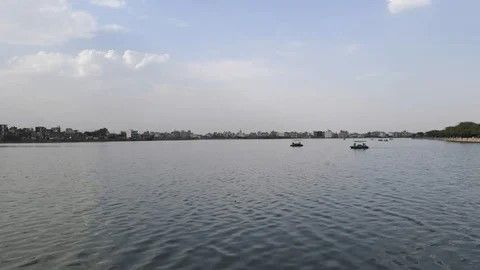
Nestled in the northwest corner of Delhi, a surprising haven of biodiversity thrives: Bhalswa Horseshoe Lake. This unique wetland, born from the wandering path of the Yamuna River, stands as a testament to the resilience of nature even amidst urban sprawl. Offering a vital ecosystem for local and migratory wildlife, Bhalswa Horseshoe Lake presents a significant opportunity for ecological preservation, responsible tourism, and a deeper appreciation for nature within the Indian capital.
Originally sculpted by The Yamuna, the lake’s distinctive horseshoe shape is a legacy of the river’s ever-changing course. As the Yamuna carved its way through the landscape over centuries, it eventually abandoned a loop, leaving behind a crescent-shaped depression. This depression, coupled with fortified embankments and dykes built over time, naturally transformed into the lake we know today. While its formation is intrinsically linked to the river's history, the lake has now developed its own unique character and ecological significance.
The Bhalswa Horseshoe Lake's importance lies in its role as a critical wetland ecosystem. These wetlands, often overlooked and undervalued, play a crucial role in maintaining ecological balance. They act as natural filters, purifying water and reducing pollution. They also serve as sponges, absorbing excess water during periods of heavy rainfall and mitigating the risk of flooding. Crucially, they provide habitat for a diverse range of flora and fauna, making them biodiversity hotspots.
The Bhalswa Horseshoe Lake excels in this regard. It is a haven for a remarkable array of bird species, both resident and migratory. The lake attracts a diverse collection of waterfowl, including ducks, geese, and coots, which find refuge and sustenance in its waters. Storks and cranes, elegant and imposing, can also be spotted wading through the shallows, foraging for food. Birdwatchers from across Delhi and beyond flock to the lake, drawn by the opportunity to observe these magnificent creatures in their natural habitat.
The vegetation surrounding the lake further enhances its ecological value. The eastern banks are dotted with shrubs and trees, primarily Acacia, Babool, and Keekar. These species, well-adapted to the semi-arid climate of Delhi, provide shade, shelter, and nesting sites for various birds and other animals. They also contribute to the overall health of the ecosystem by enriching the soil and preventing erosion.
Beyond its ecological significance, Bhalswa Horseshoe Lake holds considerable potential as a destination for eco-tourism. Delhi, often associated with its historical monuments and bustling markets, offers limited opportunities for experiencing nature within its boundaries. Bhalswa Horseshoe Lake provides a valuable alternative, offering a chance to escape the concrete jungle and immerse oneself in the tranquility of nature.
However, realizing this potential requires careful planning and responsible management. The lake's fragile ecosystem is vulnerable to the pressures of urbanization, including pollution, encroachment, and unsustainable development. Protecting the lake's water quality is paramount, requiring measures to prevent the discharge of untreated sewage and industrial waste. Controlling invasive species, which can outcompete native plants and disrupt the food chain, is also crucial.
Developing sustainable tourism infrastructure around the lake can benefit both the environment and the local community. Well-designed walking trails, birdwatching hides, and informative signage can enhance the visitor experience while minimizing disturbance to the wildlife. Engaging the local community in conservation efforts, through employment opportunities and educational programs, can foster a sense of ownership and responsibility for the lake's well-being.
The promotion of responsible tourism principles is essential. Visitors should be encouraged to respect the environment, avoid littering, and minimize noise pollution. Educating visitors about the lake's ecology and the importance of conservation can foster a greater appreciation for nature and inspire them to become responsible stewards of the environment.
Bhalswa Horseshoe Lake represents a unique opportunity to promote environmental awareness and sustainable development in Delhi. By carefully managing its resources and promoting responsible tourism, the lake can serve as a model for other urban ecosystems in India. It can become a valuable asset for the city, providing not only ecological benefits but also recreational opportunities, educational experiences, and a connection to nature that is often lacking in urban environments.
In conclusion, Bhalswa Horseshoe Lake is more than just a lake; it is a vital ecosystem, a haven for wildlife, and a potential destination for eco-tourism. Its ecological importance, coupled with its proximity to a major urban center, makes it a valuable asset for Delhi and a symbol of the potential for nature to thrive even amidst urbanization. Protecting and sustainably managing Bhalswa Horseshoe Lake is not only an environmental imperative but also an opportunity to enhance the quality of life for the residents of Delhi and showcase India's commitment to conservation and sustainable development. It is a reminder that even within the concrete jungle, pockets of Natural Beauty can flourish, offering a sanctuary for both wildlife and the human spirit.